

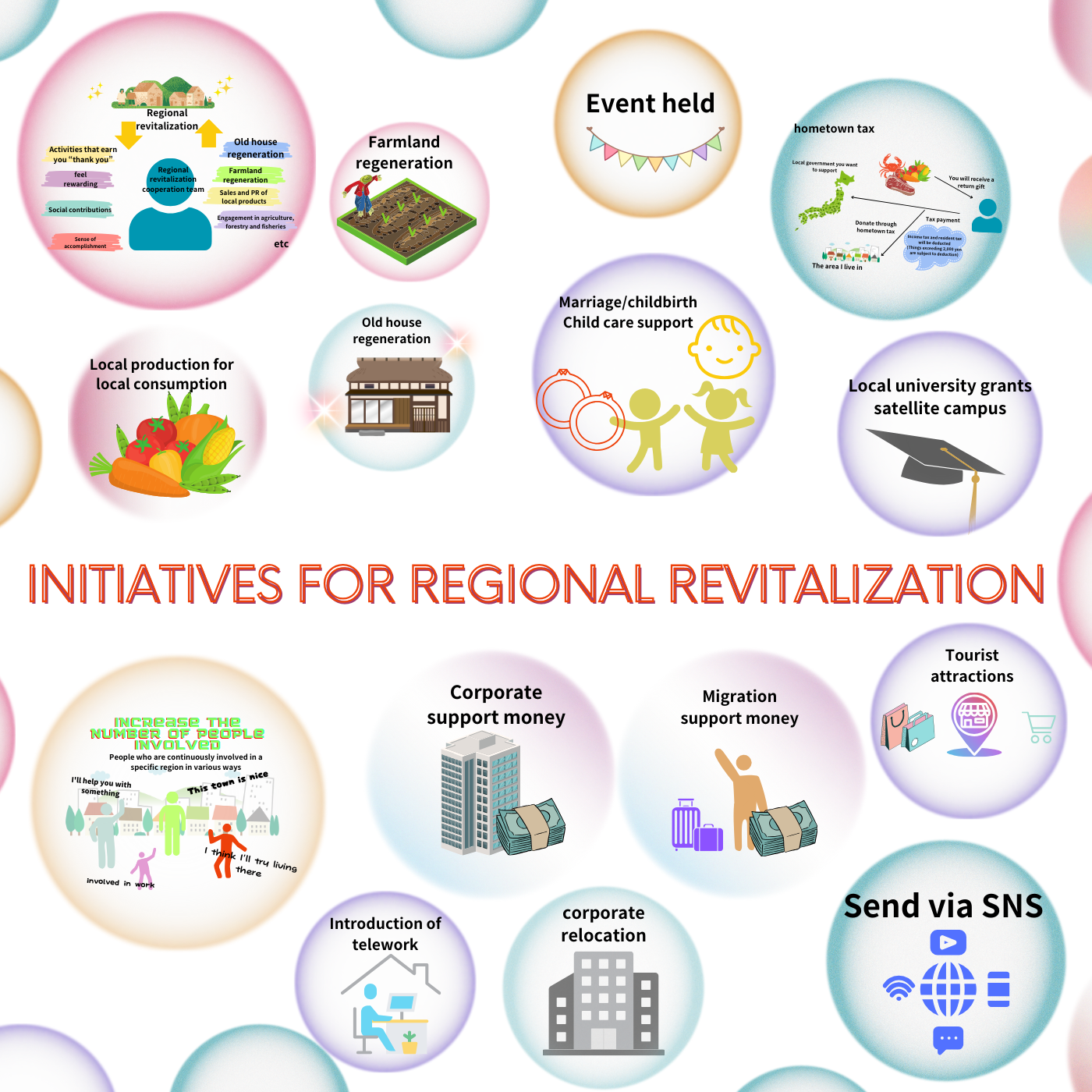
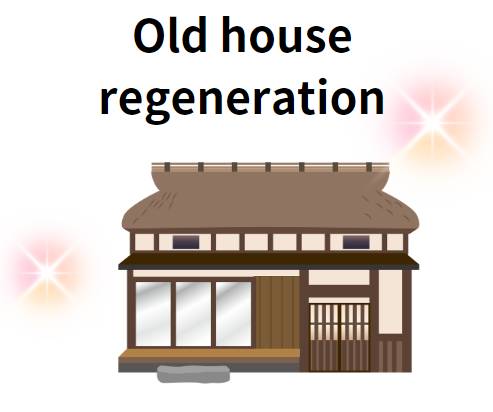
By making use of the old components and structures of old folk houses and
transforming them
into homes that are adapted to modern life, people living in those areas will be
able to pass on the history and memories.
In addition, by reusing old folk houses,
we contribute to reducing the burden on the global
environment,
and by partnering with companies, lodging facilities in old folk houses have been created, making them
very popular lodging destinations.
The benefits include being cool in the summer, having a spacious floor plan, and being completely free
from the crowds of the city, which can only be experienced in old folk houses.
Coverage of the Omikawa Residence, an old folk house restoration here
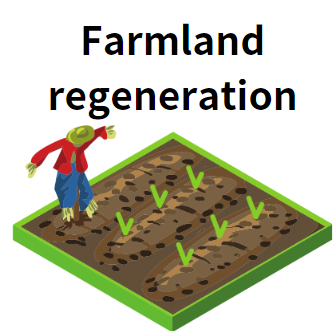
The number of people engaged in farming is decreasing year by year due to the lack of successors in farming and the aging population.
Naturally, as the number of farmers decreases, the amount of abandoned farmland increases.
As weeds grow and become poorly managed, the land becomes more and more dilapidated, and if the land is considered to be a place
that is difficult for people to see, there is a risk that it will become a target for illegal dumping.
In order to increase Japan's food self-sufficiency rate and make agriculture sustainable, regeneration work, soil preparation,
planting, processing, and sales are carried out by farmers who take over dilapidated farmland and resume crop production,
as well as farmland intermediary management organizations.
In response to these trial efforts, the Ministry of Agriculture, Forestry and Fisheries has established a subsidy system
to promote the utilization of degraded farmland, etc., to support the regeneration of degraded farmland.
The amount to be granted varies depending on the target project, so you will need to consult with the local government office and follow the necessary procedures to ensure that you receive the most appropriate support.
Farmland regeneration efforts are also being incorporated into the activities of regional revitalization cooperation groups.
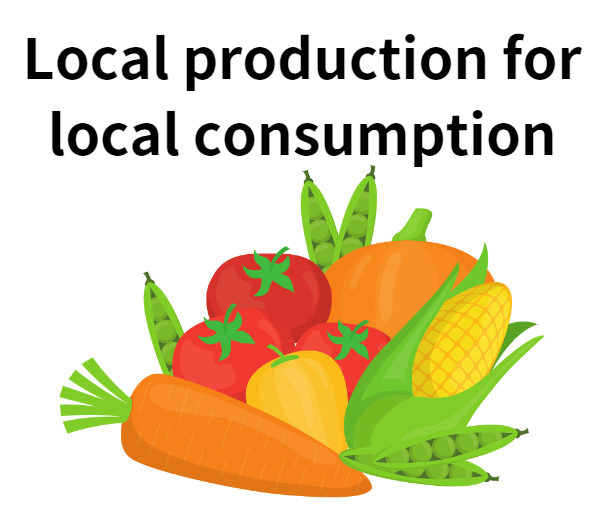
This is an abbreviation for "local production - local consumption,'' meaning that agricultural, forestry,
and fishery products produced locally should be consumed locally as much as possible.
As Japan's food self-sufficiency rate is decreasing year by year, it is important to value locally available agricultural,
forestry and fishery products and to deepen our understanding of the relationship between production and consumption.
Interview with a rice farmer here
Interviews with vegetable farmers here
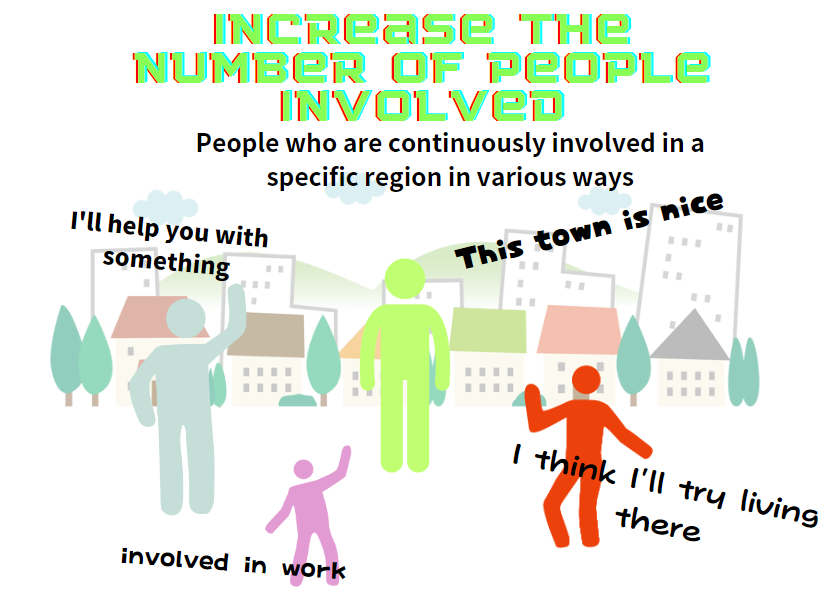
The related population refers to people who are not immigrants or tourists, but are involved in a
variety of ways with the local area.
Those who frequently visit the area for work, those
who
stay
in the area for a short period of time,
those who have relatives living there, and those who
have
visited continuously or multiple times for some reason are
considered to have a strong
relationship.
It is also classified based on the sensitivity of the mind, which may lead to permanent residence in the future.
First of all, increasing the number of people involved who have a desire to support the region
and
filling in the shortage of human resources in each region will also lead to regional
revitalization.
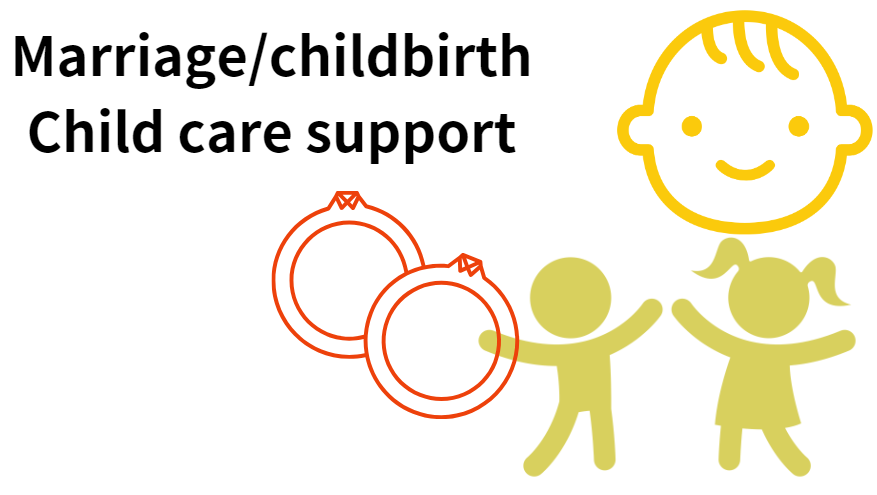
Life changes dramatically depending on the environment in which you live during marriage,
childbirth,
and raising children.
The advantage of moving to a rural area is that the fixed costs of housing are lower,
and you
can live in a larger house than in the city, and you can live comfortably.
In addition, it is a place where you can raise your children in a place rich in nature,
there are few
waiting lists for nursery schools, and there is a strong local community,
making it a safe
environment to raise your children.
Although it varies by region, all local governments have extensive child medical expense subsidy
systems.
Various initiatives have been implemented, including free medical care up to high
school
students,
day care for sick children that makes it easier for both parents to raise children,
and a 1
million yen subsidy to support housing for those raising children.
However, the disadvantages are that your options are limited in many ways, such as hospitals being
far
away,
there being fewer schools and classes, and no amusement facilities, which can make you
feel
uncomfortable.
Also, transportation is less convenient than in cities, so a car may be required depending on the
location.

In order to revitalize a region, activities that value local events will also lead to regional
revitalization.
Events attract many people and create a flow of people to the area.
It is also important to carry out events and measures that will increase the number of tourists
and
the
related population.
Recently, due to the influence of the new coronavirus, festivals have been canceled or postponed one
after another,
but events are gradually recovering.
The event tree here
Interview with a community-based singer who values local events
here

Nowadays, anyone can easily access the Internet, and SNS in particular can be said to be the easiest
information dissemination tool.
A major feature of SNS is that information is highly disseminable, and by being seen by many people,
it is an optimal tool that can be expected to help local governments become better known and
increase the number of tourists and immigrants.
In fact, video distribution by the mayor, local revitalization cooperation team,
and other
people
living in the area will lead to an increase in tourists and immigrants.

Compared to the number of universities in Tokyo, there are far fewer universities and educational
institutions in rural areas,
and many students leave rural areas to attend university.
Therefore, in order to provide equal opportunities to higher education for young people and to
develop
human resources
in local communities, there are examples of establishing faculties and research
institutes in rural areas far from the Tokyo area,
and examples of providing basic education in
favorable environments.
A satellite campus initiative is underway.
By implementing this initiative, young people will gather in rural areas
and will have the
possibility of finding employment or settling down in the future.
Furthermore, the number of departments offering regional revitalization studies at some universities
is
increasing year by year, and it can be said that the interest and importance of the subject is
increasing.

If we can attract a lot of tourists, we can create a flow of people to the area, and local
governments
can expect an increase in tax revenue.
As the number of tourists increases, consumption tax, accommodation tax, and income tax from
people
working at tourist
destinations will increase.
In addition, improvements to transportation infrastructure will be made.
Currently, there are 1,209 roadside stations nationwide (as of August 2023), and they are
expected
to
have an economic
effect and a regional revitalization effect by creating a flow of people who
buy
local
ingredients and use them as resting spots.
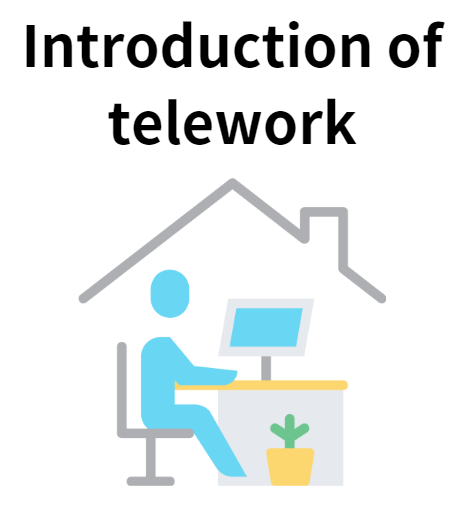
An increasing number of companies are introducing telework to solve problems such as population decline in rural areas
and concentration in the Tokyo area.
Even if you don't live in Tokyo, you can work locally since there is no commute.
Employees can also work while balancing childcare, nursing care, etc...
and maintain a work-life balance.
In addition, many companies have introduced telework due to the recent spread of the new coronavirus infection.
Telework is a very important part of modern work style reform.

By expanding into rural areas, companies can reduce start-up costs, and hiring people who live in the area as
employees creates employment in new locations and contributes to society.
From an individual perspective, it has the appeal of being able to work in an environment rich in nature,
as well as being able to relieve stress from commuting and concentrate on work.

This is a project aimed at regional revitalization.
In order to revitalize local regions, we provide escort support and subsidies for business
expenses (up to 2 million yen)
to people starting new businesses.
An executive organization selected by the prefecture will provide an amount
equivalent
to
one-half
of the expenses necessary for starting a business.
[Target people]
When starting a new business (all of the following must be met)
In prefectures other than the Tokyo area (Tokyo, Saitama, Chiba, and Kanagawa prefectures)
or
in
disadvantaged areas within the Tokyo area (areas considered to be depopulated areas,
mountain
villages for promotion,
areas where remote island development measures are being
implemented, areas
where peninsula development measures are being implemented, etc.) Starting a social
enterprise.
After the date of the government's grant decision, the applicant must register for private
practice
or establish a corporation by the end of the subsidy project period.
Lives or plans to live in the prefecture where the business is to be started.
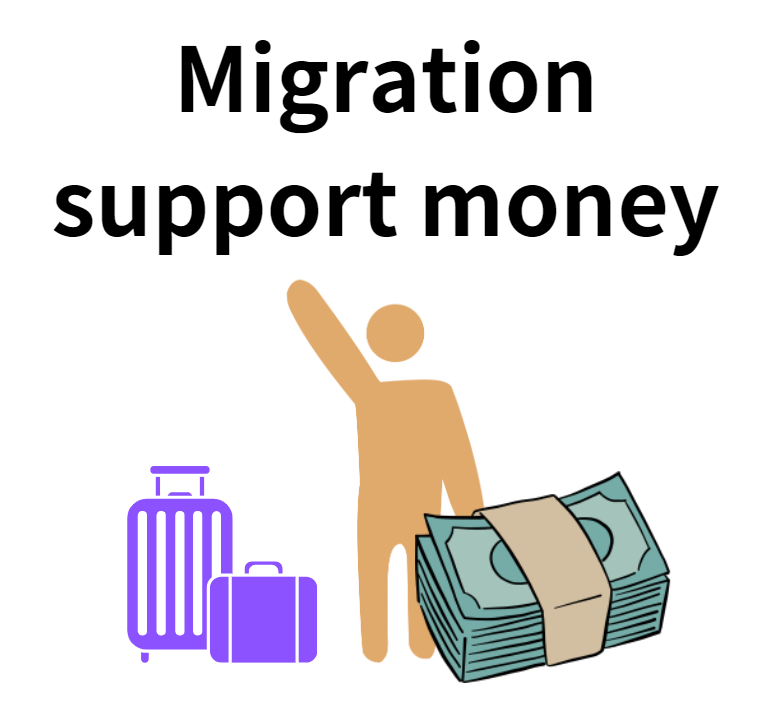
For those who commute or live in Tokyo's 23 wards (other than disadvantaged areas)
(Applicable to those commuting or living in Tokyo's 23 wards for a total of 5 years or
more
in the
10
years immediately before moving, and the most recent 1 year or more (other than
disadvantaged
areas))
Up to 1 million yen *Up to 600,000 yen for single person
For those who attended a university in Tokyo's 23 wards, lived in the Tokyo area (excluding
disadvantaged areas),
and got a job at a company in Tokyo's 23 wards after graduation,
the
period of
commuting is also covered.
Application for migration support grant must be made within 3 months or more and within 1
year
after
moving in.
After applying, you have the intention to continue living in the place you moved to.
◎Details of the system, such as implementation period and payment amount, differ depending
on each local government,
so please check the information published by the
prefecture/municipality where the project will be implemented.
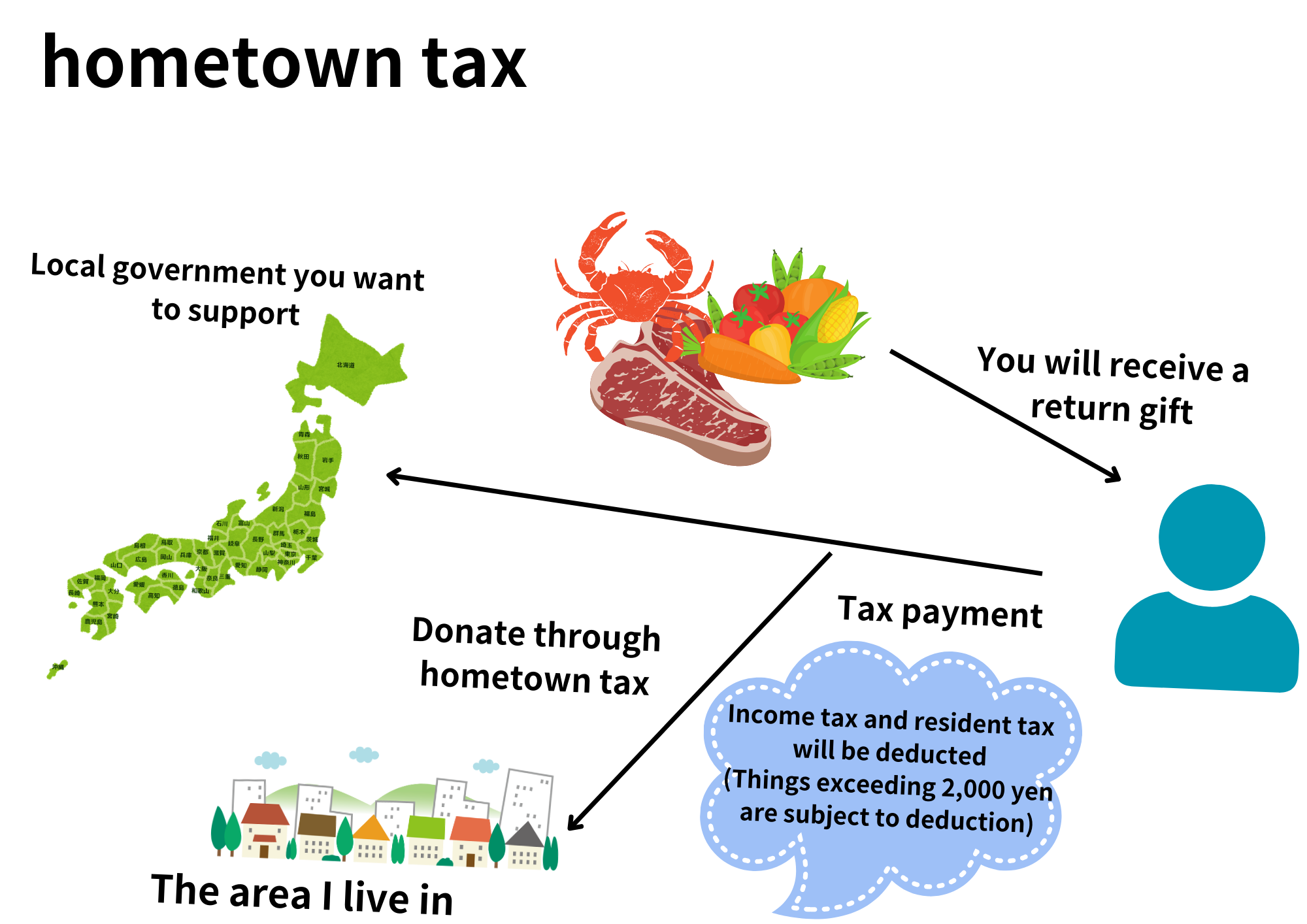
Many people are born in their hometowns in rural areas, grow up receiving various
resident
services
such
as medical care and education from local governments, and eventually move to urban
areas
when
they
go on
to higher education or find employment, where they pay taxes.
As a result, local governments in areas with large populations can receive a large
amount of
tax
revenue,
but the local government where you were born and raised does not receive
the
tax
revenue
you
pay.
Hometown tax is a system that allows you to pay taxes to the hometown where you were
born
and
raised
or
the hometown you want to support.
For salaried workers, the maximum deduction amount is calculated based on their annual
income.
As a general rule, the entire amount excluding the 2,000 yen copayment will be
deducted.
A portion of the donation amount will be deducted from income tax and resident tax.
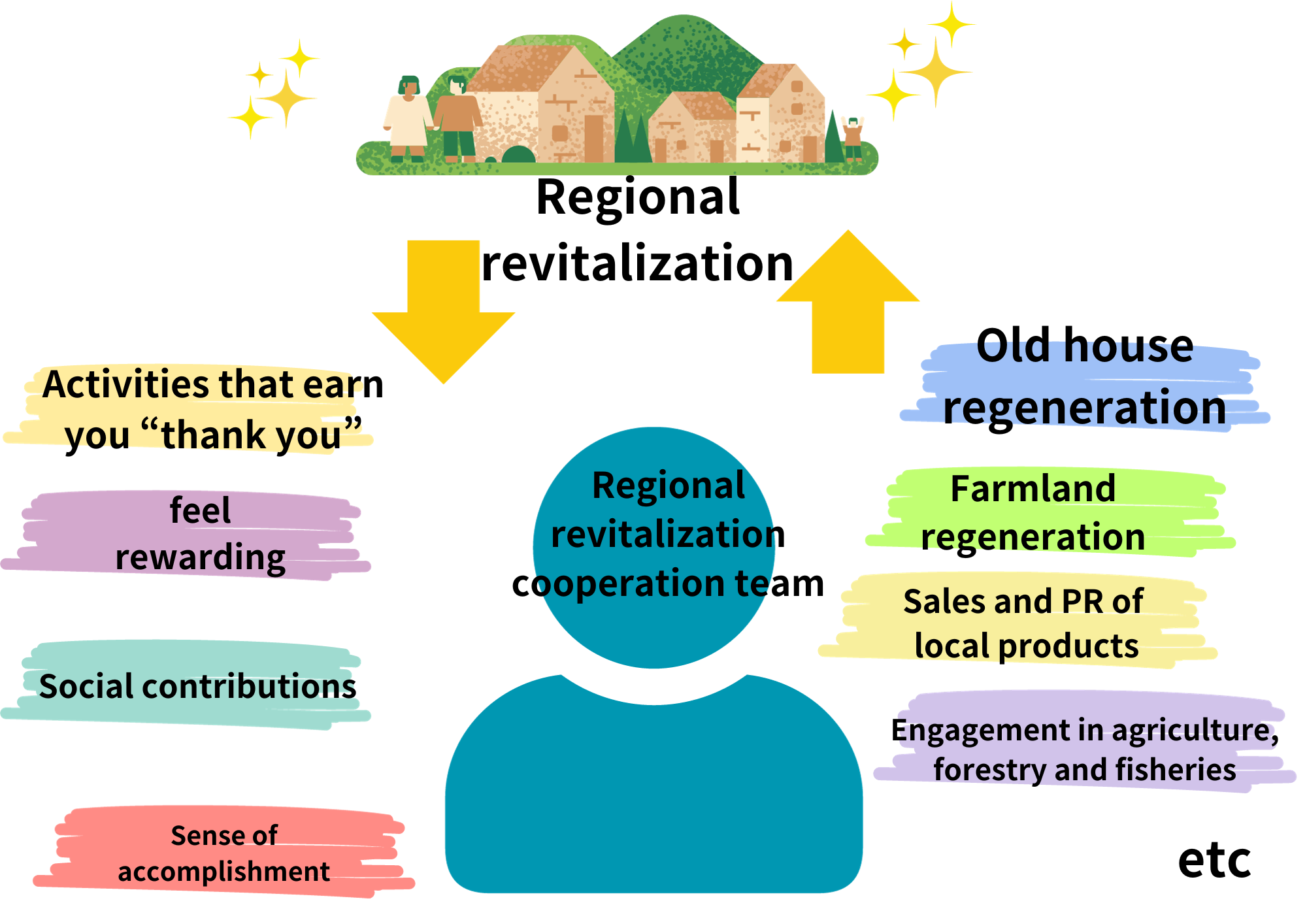
Transfer your residence card from urban areas to depopulated areas.
This is an initiative to help residents settle in the area while restoring old
houses,
regenerating farmland,
developing, selling, and promoting local products,
engaging
in
agriculture,
forestry,
and fisheries, and supporting residents.
The term of office is approximately one to three years.
JOIN General social corporation Immigration and Exchange Promotion Organization https://www.iju-join.jp/
Interview with local revitalization cooperation team
here
~For consultation on relocation in each region, please contact the Hometown Return
Center~
Permanently displaying pamphlets and materials related to rural migration
We provide information on local living and are available for consultation.
Hometown return support center:https://www.furusatokaiki.net/
